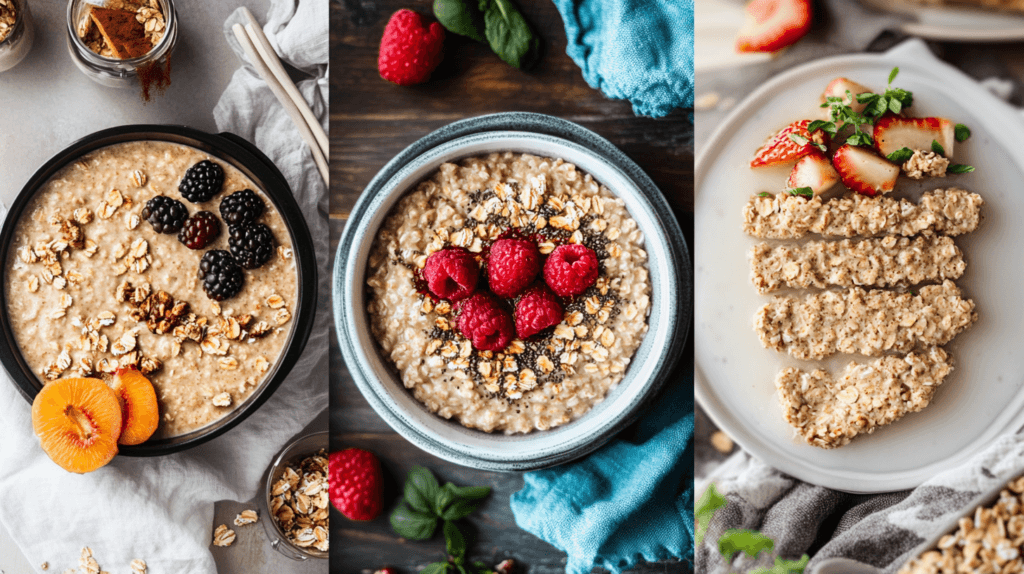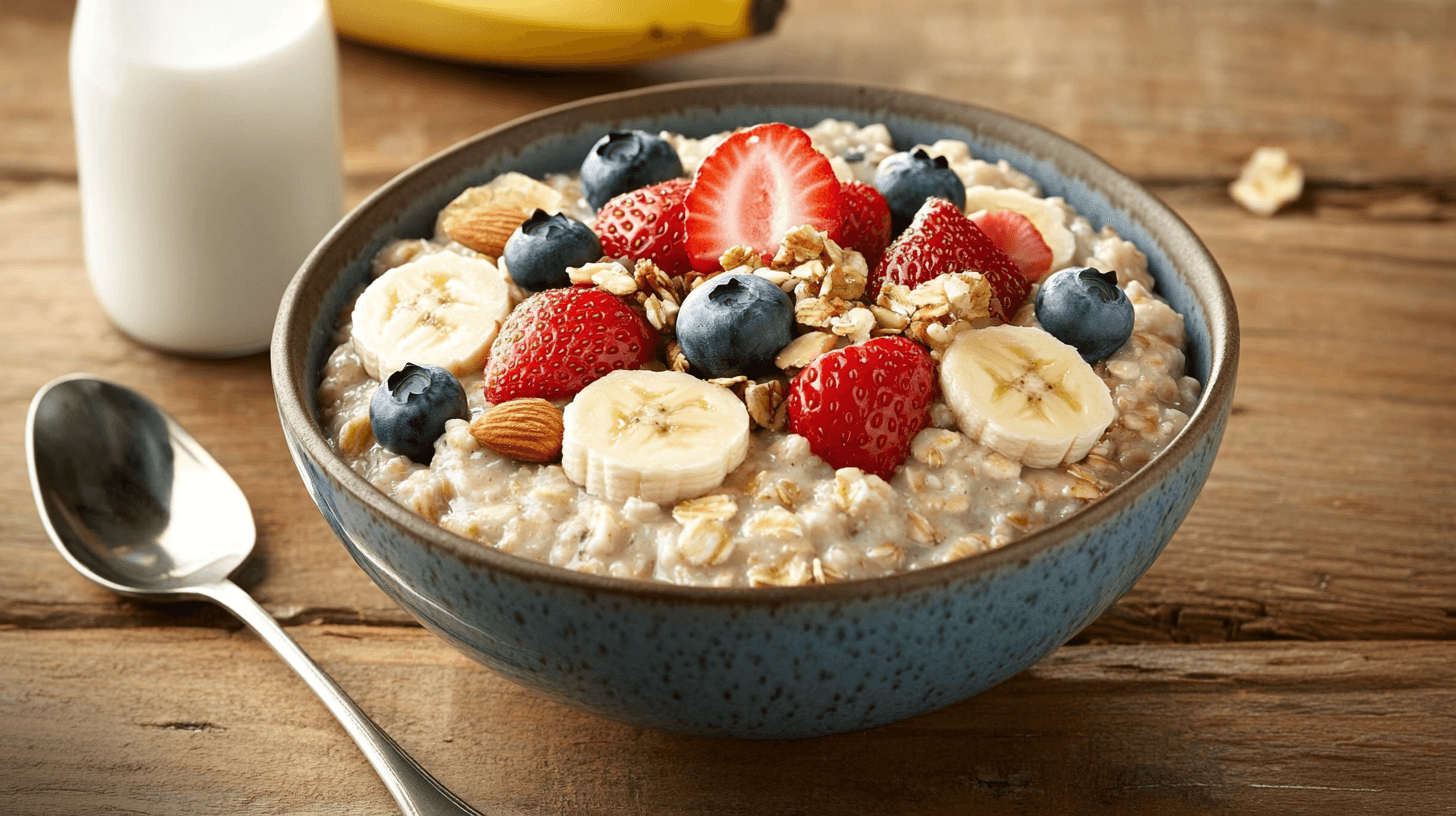Introduction
A steaming bowl of oatmeal in the morning is often synonymous with health and vitality. For decades, oatmeal has been championed as a nutritious and satisfying breakfast option. It’s versatile, easy to prepare, and packed with essential nutrients that cater to various dietary needs. But is having oatmeal every morning truly beneficial for your health? Or could there be hidden downsides to this seemingly perfect food?
In this article, we’ll dive deep into the nutritional profile of oatmeal; furthermore, we’ll explore its health benefits, discuss potential risks, and, most importantly, provide tips on how to make your morning oatmeal even more nutritious and exciting. Whether you’re a long-time oatmeal fan or someone considering adding it to your diet, this comprehensive guide will help you understand if this breakfast staple is the right choice for you; moreover, it will provide practical tips for maximizing its benefits.
Nutritional Profile of Oatmeal
Oatmeal is more than just a warm and comforting breakfast—it’s a nutrient powerhouse. Before diving into the benefits, let’s take a closer look at what makes oatmeal so nutritionally valuable and the different types available.

Types of Oatmeal
There are several forms of oatmeal, each with unique characteristics:
- Steel-Cut Oats: The least processed type, made by cutting whole oat groats into pieces. They have a nutty flavor and chewy texture, requiring longer cooking times.
- Rolled Oats: Also called old-fashioned oats, these are steamed and flattened, making them quicker to cook than steel-cut oats.
- Instant Oats: The most processed version, these cook in minutes but may contain added sugars and flavorings.
- Overnight Oats: A no-cook version where rolled oats are soaked in liquid overnight, offering convenience and customizable options.
Each type retains the core nutrients of oats but differs in cooking time, texture, and glycemic index.
Key Nutrients in Oatmeal
Oatmeal is rich in essential nutrients, making it a wholesome choice for starting the day. Here’s a breakdown:
- Fiber: A standout nutrient in oats, particularly beta-glucan, which helps with digestion, heart health, and blood sugar control.
- Protein: Oatmeal contains about 5-6 grams of protein per cup, contributing to muscle repair and satiety.
- Vitamins: Includes B vitamins like thiamine and folate, essential for energy production and brain health.
- Minerals: Packed with magnesium, phosphorus, zinc, iron, and manganese, all vital for various bodily functions.
- Antioxidants: Oats are rich in avenanthramides, unique compounds that reduce inflammation and improve blood flow.
Calorie and Macronutrient Breakdown
A typical serving of oatmeal (1 cup cooked) provides:
- Calories: Approximately 150
- Carbohydrates: 27 grams
- Protein: 5 grams
- Fat: 3 grams (mostly unsaturated fats)
This balance of macronutrients, combined with its fiber content, makes oatmeal a satisfying and energy-boosting meal.
Benefits of Eating Oatmeal Daily
Eating a bowl of oatmeal every morning is a small habit that can lead to significant health benefits. Let’s explore how this nutritious food positively impacts your body when consumed regularly.
Oatmeal and Heart Health
One of oatmeal’s most celebrated benefits is its ability to improve heart health.
- Lowering LDL Cholesterol: The beta-glucan fiber in oatmeal forms a gel-like substance in your digestive tract, which binds to cholesterol and helps remove it from the body. This process can significantly reduce “bad” LDL cholesterol levels.
- Reducing Blood Pressure: Oatmeal’s high magnesium and potassium content help regulate blood pressure by relaxing blood vessels and improving circulation.
- Boosting Heart Function: The antioxidants in oats, especially avenanthramides, protect heart cells from oxidative damage and inflammation.
Digestive Health and Fiber Benefits
Fiber is essential for maintaining a healthy digestive system, and oatmeal delivers it in abundance.
- Promotes Regularity: The soluble fiber in oatmeal absorbs water, making stools softer and easier to pass, which can prevent constipation.
- Supports Gut Health: Oatmeal acts as a prebiotic, nourishing the beneficial bacteria in your gut and improving digestion.
Energy Boost and Sustained Satiety
If you struggle with mid-morning hunger, oatmeal is the perfect solution.
- Slow-Release Energy: The complex carbohydrates in oats are digested slowly, providing a steady energy supply throughout the morning.
- Keeps You Full Longer: The combination of fiber and protein in oatmeal promotes feelings of fullness, reducing the urge to snack between meals.
For more inspiration on energy-packed meals, check out our guide on Healthy Breakfast Bowls to diversify your morning options.
Oatmeal for Weight Management
Adding oatmeal to your morning routine can help with both weight loss and maintenance.
- Reduced Calorie Intake: Oatmeal’s high fiber content curbs appetite, helping you naturally eat fewer calories throughout the day.
- Supports Metabolism: Pairing oatmeal with protein-rich toppings, like Greek yogurt or nuts, can enhance its metabolism-boosting effects.
Oatmeal and Blood Sugar Control
Oatmeal is especially beneficial for those managing or at risk of diabetes.
- Low Glycemic Index: Steel-cut and rolled oats release glucose slowly into the bloodstream, preventing spikes in blood sugar levels.
- Improved Insulin Sensitivity: Regular consumption of oats may enhance the body’s response to insulin, aiding blood sugar regulation.
Risks or Downsides of Eating Oatmeal Daily
While oatmeal is often hailed as a superfood, consuming it daily isn’t without its potential downsides. These issues usually stem from preparation methods or dietary preferences rather than the oatmeal itself. Let’s explore some considerations to keep in mind.

Overloading on Toppings
- Excessive Sugars and Calories: Adding too much sugar, honey, syrups, or sweetened toppings can turn a healthy bowl of oatmeal into a calorie bomb. This negates many of its health benefits.
- Unhealthy Add-Ons: Processed toppings like chocolate chips or flavored creamers may add unnecessary fats and artificial ingredients.
Relying Too Much on Oatmeal
- Nutrient Imbalances: Eating oatmeal every morning without variety may result in nutrient deficiencies over time. Oats are rich in certain vitamins and minerals but lack others, like vitamin C and essential fats.
- Boredom Leading to Unhealthy Choices: Over time, eating the same breakfast every day can lead to boredom, making it tempting to add less healthy ingredients for variety.
Potential Digestive Issues
- Gas and Bloating: For individuals unaccustomed to a high-fiber diet, oatmeal’s fiber content might cause bloating or gas initially. Gradually increasing fiber intake can alleviate this.
- Sensitivity to Phytic Acid: Oats contain phytic acid, which can interfere with the absorption of some minerals like iron and zinc. While not typically a concern for most people, it may be problematic for those with existing deficiencies.
Considerations for Gluten Sensitivity
- Cross-Contamination: While oats are naturally gluten-free, they’re often processed in facilities that handle gluten-containing grains. For individuals with celiac disease or gluten intolerance, choosing certified gluten-free oats is crucial.
Caloric Misjudgment
- Underestimating Serving Sizes: A proper serving of oatmeal is about ½ cup of dry oats (roughly 150 calories), but adding extras like milk, nuts, and fruits can quickly increase the calorie count.
- Skipping Protein Sources: Oatmeal is low in protein, so skipping high-protein add-ins may leave you feeling hungry sooner.
Environmental Considerations
- Overreliance on Processed Oats: Highly processed options like instant oatmeal often contain added sugars, flavors, and preservatives. Opting for less processed varieties can mitigate this concern.
How to Enhance the Benefits of Oatmeal
Oatmeal is already a nutrient-rich breakfast option, but you can easily make it even healthier and more satisfying with a few thoughtful tweaks. By incorporating additional ingredients and optimizing preparation methods, you can turn your morning oatmeal into a complete, balanced meal.
Add Nutrient-Dense Toppings
Boost the nutritional value of your oatmeal with these wholesome additions:
- Fruits: Add fresh or frozen fruits like berries, bananas, apples, or mangoes for natural sweetness, antioxidants, and vitamins.
- Nuts and Seeds: Almonds, walnuts, chia seeds, and flaxseeds provide healthy fats, protein, and additional fiber.
- Spices: Sprinkle cinnamon, nutmeg, or ginger for flavor and potential anti-inflammatory benefits without adding sugar.
- Dark Chocolate Chips: In moderation, dark chocolate (70% cocoa or higher) adds a touch of indulgence and antioxidants.
Incorporate Protein Sources
Since oatmeal is relatively low in protein, consider pairing it with protein-rich ingredients:
- Greek Yogurt: Stirring in a dollop of Greek yogurt adds creaminess and a significant protein boost.
- Nut Butters: Peanut, almond, or cashew butter adds flavor, protein, and healthy fats.
- Protein Powder: A scoop of your favorite protein powder can transform your oatmeal into a post-workout meal.
Choose Healthier Sweeteners
Swap processed sugars for natural alternatives:
- Honey or Maple Syrup: Use sparingly for a touch of sweetness without overloading on refined sugars.
- Mashed Fruits: Bananas or applesauce can naturally sweeten your oatmeal while adding extra nutrients.
- Stevia or Monk Fruit Sweetener: For a calorie-free option, try these natural sugar substitutes.
Experiment with Liquid Bases
Replace plain water with nutrient-rich liquids:
- Milk: Cow’s milk adds calcium and protein, while plant-based options like almond or soy milk provide variety and added nutrients.
- Coconut Milk: For a creamy and tropical twist, coconut milk pairs well with oatmeal.
Incorporate Superfoods
Elevate your oatmeal with superfoods that offer extra health benefits:
- Chia Seeds: Packed with omega-3s, fiber, and protein, chia seeds can be mixed in or sprinkled on top.
- Flaxseeds: Ground flaxseeds boost omega-3s and lignans, which may support hormone balance.
- Goji Berries or Dried Fruits: Use sparingly to add a chewy texture, antioxidants, and vitamins.
Curious about how different breakfast choices compare? Learn more in our detailed post: Are Breakfast Bowls Good for You?
Preparation Tips for Maximum Benefits
- Soak Your Oats: Soaking oats overnight can improve digestibility and reduce phytic acid, enhancing nutrient absorption.
- Avoid Instant Oats: Opt for rolled or steel-cut oats to maintain more fiber and avoid added sugars.
- Balance Macronutrients: Combine carbohydrates (oats), protein (nuts or yogurt), and healthy fats (seeds or nut butter) for a balanced meal.
Different Ways to Prepare Oatmeal
Oatmeal is one of the most versatile breakfast foods, with countless preparation methods to suit every taste and lifestyle. Whether you prefer a quick meal, a make-ahead option, or a hearty dish, oatmeal can adapt to your needs. Let’s explore some popular ways to prepare it.

Traditional Stove-Top Oatmeal
The classic method of cooking oatmeal involves simmering it on the stove.
- Ingredients: Rolled oats, water or milk, and optional toppings like fruits, nuts, or spices.
- Preparation:
- Combine oats and liquid (usually a 1:2 ratio) in a pot.
- First, bring to a boil; next, reduce the heat and simmer for 5–10 minutes, stirring occasionally.
- Add toppings before serving.
- Benefits: This method produces a warm, creamy texture and allows for easy customization.
Overnight Oats
A no-cook option that’s perfect for busy mornings.
- Ingredients: Rolled oats, milk or plant-based alternatives, and optional add-ins like chia seeds, yogurt, or fruits.
- Preparation:
- Mix oats and liquid in a jar or container (1:1 or 1:1.5 ratio).
- Add desired extras, stir well, and refrigerate overnight.
- Enjoy cold or warmed up the next morning.
- Benefits: Convenient, time-saving, and great for meal prepping.
Baked Oatmeal
This method transforms oatmeal into a hearty, sliceable dish.
- Ingredients: Rolled oats, milk, eggs, sweeteners, baking powder, and mix-ins like fruits, nuts, or chocolate chips.
- Preparation:
- Combine ingredients in a baking dish.
- Bake at 350°F (175°C) for 30–40 minutes until golden brown.
- Serve warm or at room temperature.
- Benefits: Ideal for feeding a crowd and stays fresh for days.
Microwave Oatmeal
For those short on time, the microwave offers a quick solution.
- Ingredients: Instant or rolled oats and water or milk.
- Preparation:
- Combine oats and liquid in a microwave-safe bowl (1:2 ratio).
- Microwave on high for 1–2 minutes, stopping to stir halfway through.
- Add toppings and enjoy.
- Benefits: Ready in minutes with minimal cleanup.
Savory Oatmeal
For a unique twist, oatmeal can also be prepared with savory ingredients.
- Ingredients: Steel-cut oats, broth or water, vegetables, and toppings like eggs, cheese, or avocado.
- Preparation:
- Cook oats in broth instead of water or milk.
- Stir in cooked vegetables, herbs, and spices.
- Top with a poached egg or shredded cheese for a hearty meal.
- Benefits: A versatile option for lunch or dinner, packed with nutrients.
If you’re exploring creative breakfast ideas, don’t miss our collection of Crescent Roll Breakfast Ideas for a quick, easy twist.
Oatmeal Smoothies
Blending oats into a smoothie creates a thick, satisfying drink.
- Ingredients: Rolled oats, milk, yogurt, fruits, and optional protein powder or nut butter.
- Preparation:
- Blend all ingredients until smooth.
- Serve immediately for a quick, portable breakfast.
- Benefits: Great for those who prefer drinking their breakfast.
FAQs About Eating Oatmeal Daily
Here are some common questions and answers about the daily consumption of oatmeal, designed to clear up any confusion and provide practical tips.
1. Is oatmeal suitable for all age groups?
Yes, oatmeal is a great option for people of all ages, from toddlers to seniors. Its soft texture makes it easy to chew, and its nutrients benefit growing children, active adults, and older individuals looking to maintain heart and digestive health.
2. Can oatmeal cause weight gain if eaten daily?
Oatmeal is low in calories and can help with weight control. However, adding too much sugar, cream, or nut butter can lead to weight gain. Using healthy, portioned toppings will keep it nutritious.
3. Is oatmeal safe for gluten-intolerant individuals?
Oats are naturally gluten-free, but they can be cross-contaminated with gluten during processing. To ensure safety, people with celiac disease or gluten sensitivity should choose certified gluten-free oats.
4. What happens if I eat too much oatmeal?
While oatmeal is healthy, consuming excessive amounts could lead to:
- Overeating Fiber: This might cause bloating, gas, or stomach discomfort.
- Nutrient Imbalance: A diet overly reliant on oatmeal may lack variety, leading to deficiencies in nutrients not found in oats.
5. What are the healthiest toppings for oatmeal?
Healthy topping options include:
- Fresh fruits (e.g., berries, bananas).
- Nuts and seeds (e.g., almonds, chia seeds).
- Unsweetened nut butters.
- Spices like cinnamon or nutmeg.
- Low-sugar options like unsweetened coconut flakes or cacao nibs.
6. How much oatmeal should you eat daily?
A standard serving size is ½ cup of dry oats (about 150 calories), which expands to around 1 cup when cooked. For most people, this portion provides enough nutrients to fuel the day without overloading on calories. Adjust portions based on your activity level and dietary needs.
Final Thoughts
Eating oatmeal every morning can be a key part of a healthy diet. Full of fiber, protein, vitamins, and minerals, oatmeal helps your heart, supports digestion, gives you steady energy, and helps with weight control. You can make it your own with different toppings, making it a tasty and healthy way to start your day.
Still, like any food, it’s important to eat oatmeal in moderation. Adding too much sugar or high-calorie toppings, or eating it too often without other healthy foods, can reduce its benefits. Choosing less processed oats and adding healthy toppings like fruits, nuts, and seeds will help you get the most from your breakfast.
Eating oatmeal every day is healthy and can be a tasty habit that fits easily into a balanced diet. Changing how you prepare it and using different toppings can help you enjoy this superfood without getting bored.

